Sol Chip
Everlasting Power for IoT Devices
157% of funding target

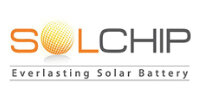
Highlights
Highlights
Patented breakthrough energy harvesting technology, with multiple applications
Sol Chip’s patented Light Chip™ is exceptionally small, efficient, and easy to integrate. It works in both outdoor and indoor environments. When coupled with Sol Chip’s innovative charging and control circuitry, the Light Chip creates a ‘solar battery’ that provides never-ending energy 24/7/365 to small devices. The ability to eliminate batteries and wires as a power source for small devices has numerous applications in many markets such as precision agriculture, industrial IoT, smart home, smart cities, and asset management, all presenting multi-billion-dollar market opportunities. Sol Chip is already deploying unique precision agriculture based on this technology and piloting solutions in several other markets. Customers and partners are convinced of the superiority of the Sol Chip solution.
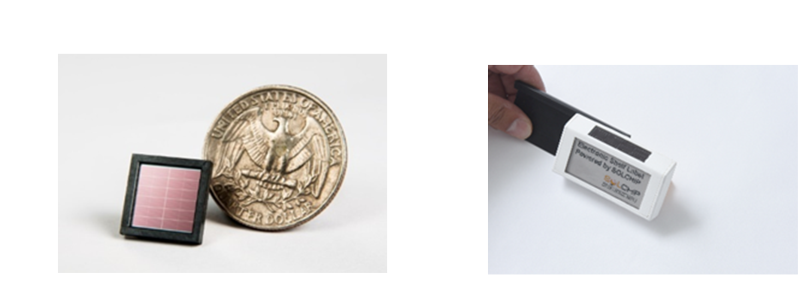
Investment alongside international VCs and Israel Electric Corporation
Sol Chip is backed by investors and VCs in Israel and around the world. The company has already raised funds from the Trendlines group - the leading incubator in Israel that invests in early-stage agricultural ventures, and from the serial investor Vincent Tchenguiz’s group. Other notable investors are Israel Electric Corporation and Israel Innovation Authority.

A comprehensive solution for precision agriculture
Based on the Light Chip, Sol Chip built a complete sensing and control platform for precision agriculture. It can read data from dozens of sensors, deliver this data via long-range communication to a crop-specific irrigation and fertilization decision support system, receive instructions to control valves and switches and provide enough energy to execute these commands . Using the Sol Chip solutions results in better crops, improved yield, and a substantial saving in water and chemical costs.
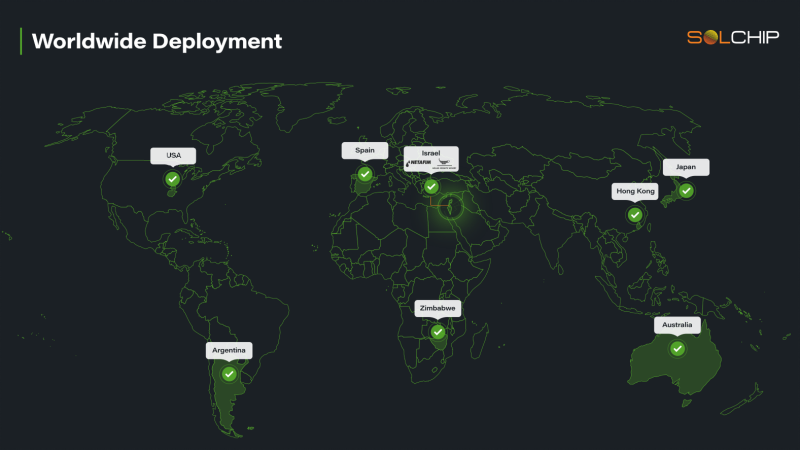
An opportunity to become the data company for precision agriculture.
By providing the energy source, the communications infrastructure, the sensor and valve connectivity, the data cloud and the decision support system, Sol Chip has a unique opportunity to become the data company for precision agriculture, leveraging millions of data points to provide valuable insights to farmers, agro-chemical companies, and government organizations.
.png)
Licensed by Netafim, the worldwide leader in precision irrigation, and deployed at customer sites worldwide.
Netafim, the worldwide leader in precision irrigation, became a non-exclusive licensee of the Sol Chip technology. The Sol Chip Solar Battery now powers Netafim’s NetBeat product, delivering the required energy to perform in-field sensing as well as relay the data to the Netafim cloud. Netafim will start deploying systems with embedded Solar Batteries this year. Aside from Netafim, Sol Chip products are already deployed around the globe. For instance, Golan Heights Winery in Israel uses Sol Chip devices to monitor its vineyards, and efficiently produce high-quality wines..
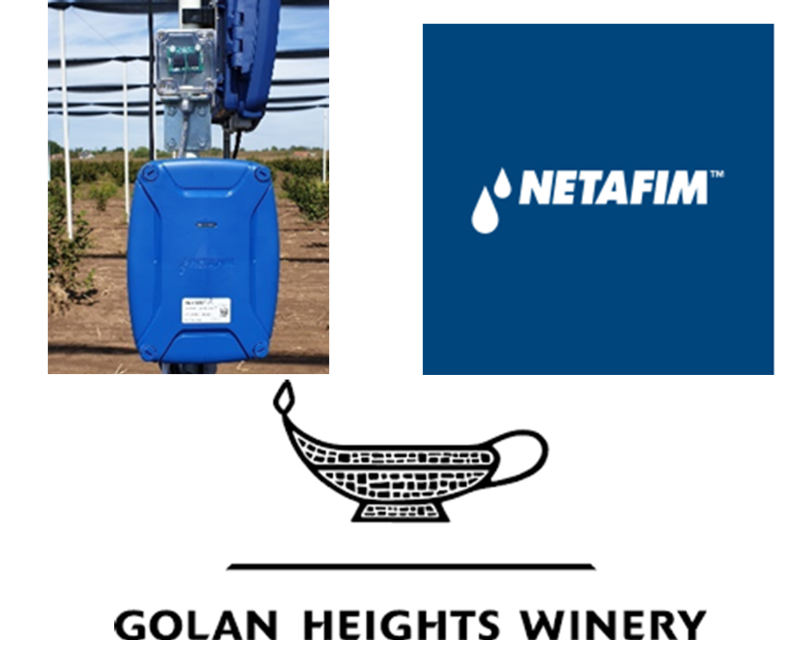
World-class team of seasoned experts
Sol Chip is led by a world-class team of experienced experts in business, technology and agriculture. Yuval Boger, the company’s CEO is a graduate of the IDF Talpiot program and brings over 25 years of proven track-record of developing and bringing breakthrough products to market. Alongside Yuval, the company’s leadership includes Dr. Shani Keysar, inventor of the technology, author of dozens of articles and patents, with diverse research and development experience at the Technion and at Towerjazz. Additionally, Rami Friedlander, its CTO, who holds more than 25 years of leadership in global companies such as nVidia, Marvell and Zoran and holds 12 granted patents. Joining them is Dan Dishback, a serial entrepreneur and a team of highly-skilled professionals.
.png)
Pitch
Pitch
The need for everlasting energy is ever-present and has multiple applications in a wide range of fields and domains:
Billions of small Internet-connected devices need a power source that does not rely on batteries or wires.
There are several reasons why batteries are a limiting factor for devices:
- Limited Lifespan: Batteries run out and need to be replaced or manually recharged. Depending on where the device is, replacing the battery can be expensive and inconvenient – such as having to drive to a remote location every few months.
- Limited Functionality: Batteries limit the functionality of the device. Because they have limited energy storage capacity, manufacturers are forced to limit the functionality or the reporting frequency of IoT devices, just to meet the power constraints.
- Size constraints: Batteries sometimes force the device to be larger than it needs to be. A home security sensor installed in a window, for instance, is as large as it is just because of the battery.
Wires and power cords are also limiting: they constrain the mobility of a device and require a nearby power outlet.
Freedom from batteries and wires can open new opportunities for manufacturers and deliver convenience as well as value to customers.
Precision agriculture, a multi-billion-dollar market, desperately needs such a solution.
Farmers and growers use data from a variety of in-ground and above-ground sensors to make smarter decisions about irrigation, fertilization and other aspects of crop management. This process help crops reach their genetic potential and results in higher quality product, better yield, and significant savings on water and chemical costs. But such solutions rely on the ability to sample a wide variety of sensors, to frequently transmit the information to the cloud, to receive irrigation and fertilization commands and then to execute them by powering valves and switches.
All these activities require power, and an ideal solution is one that does not require the farmer to go out to the field and replace batteries every few months. Similarly, powering agricultural devices using large and cumbersome solar panels is a problematic solution: these panels need to be taken down during harvesting, and are often subject to theft. What is needed is a compact solution that takes care of the energy and communications needs of these applications.
Other markets have similar needs.
The need for everlasting energy for small Internet-connected devices extends to other markets beyond precision agriculture. Smart cities, for instance, need smart utility meters. Industrial plants have remote locations and sensors that cannot rely on receiving power from the electrical grid. Location trackers – whether for large containers or small dogs – need portable power. Owners of smart home devices would like to install them without wires nor the need to replace batteries from time to time. A typical retail store might have tens of thousands of electronic shelf labels and replacing batteries for them is a never-ending full-time job. The need for small, efficient energy harvesting technology is nearly universal.
The Solution
Sol Chip developed a revolutionary patented ‘solar-panel-on-a-chip’. The chip, about the size of a human fingernail, efficiently converts indoor or outdoor light into energy. Together with its specialized control circuit, Sol Chip provides everlasting power source for IoT applications.
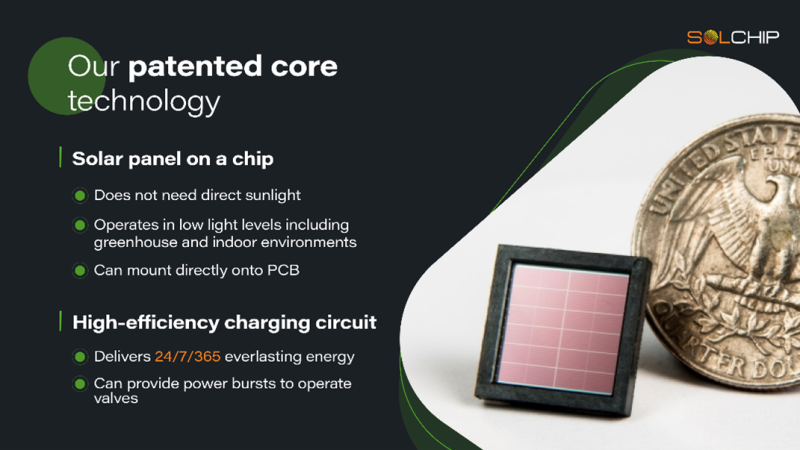
Sol Chip integrated the Light Chip into a powerful precision agriculture platform, which can read data from dozens of sensors, send that data to the cloud without a cellular connection, and remotely turn on irrigation valves. This is a zero-maintenance solution that eliminates the need for manual measurements, manual operation of valves as well as frequent trips to replace batteries.
The Sol Chip solution, called SolTag, includes the following key components:
- An everlasting energy source, based on the company’s Light Chip modules
- Connectivity to dozens of different sensors
- The ability to power valves and switches without an external power source.
- Two-way communications based on the LoRAWAN technology, allowing units to communicate at distances of up to 15 km with a central gateway. This technology, now adopted as part of the Amazon Sidewalk effort, is ideal for low-power IoT applications.
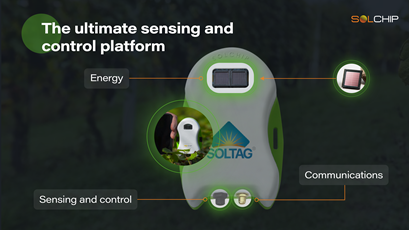
The technology
The Sol Chip SolTag solves the key issues that have held back the deployment of precision agriculture:
- It samples sensors and powers valves without needing large solar panels or battery replacements.
- It can support numerous types of sensors, allowing selecting the right sensors based on the type of crop that is being grown. New types of sensors are easy to add.
- A reliable communications link that does not rely on cellular connectivity.
- Bi-directional communications that allow the system to report the sensors and then to receive commands for execution, thus providing a closed loop solution.

To provide automated irrigation for different types of crops, Sol Chip now offers a decision-support software module that optimally provides irrigation recommendation for dozens of different crops. Sol Chip is unique in its ability to connect to the different sensors that are important to each crop, to automatically provide crop-specific recommendations and then present them to the farmer with the option to execute them remotely.
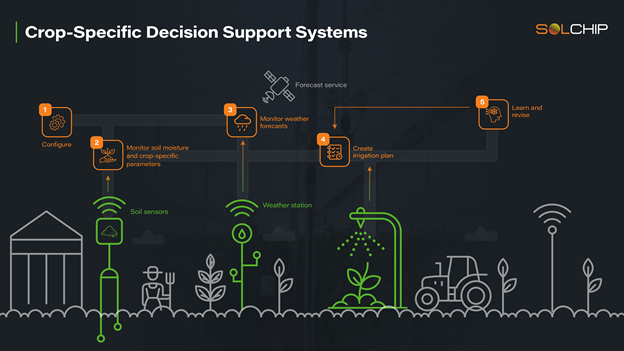
While Sol Chip provides a complete end-to-end solution for those interested in precision agriculture, it can also act as the power, data and communications backbone to upgrade existing ones. For instance, if a customer is unhappy with the service or the price of their current solutions, or if their current 3G network will stop working soon, they can replace the communications backbone with Sol Chip’s modern equipment.
Our access to extensive information from numerous sensors, geographies and crops provides unique opportunities to leverage the data in other ways.
Precision agriculture is just the tip of the iceberg. There are many additional applications where a compact and environmentally-friendly method to provide everlasting energy is a strong competitive advantage. These include smart cities, industry 4.0, asset trackers, smart home devices, security systems and many more. Sol Chip is negotiating proof of concepts that will serve as a platform for growth beyond the multi-billion-dollar precision agriculture market. Sol Chip is also negotiating additional licensing deals for asset tracking, industrial IoT and other applications.
Sol Chip’s technology is protected by several granted patents, including:
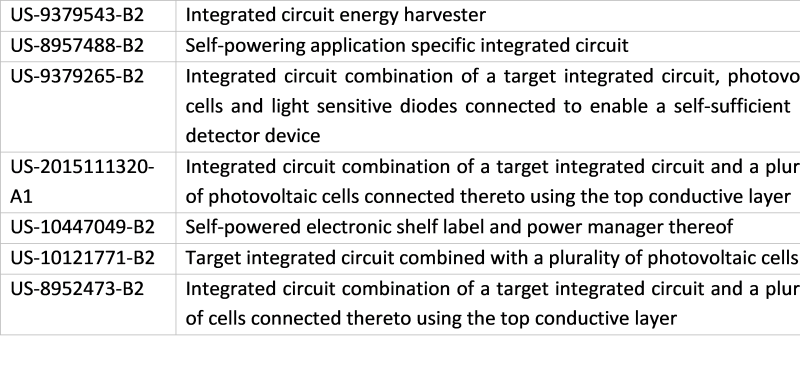
The Light Chip includes a patented manufacturing process that enables the integration of photovoltaic cells in the existing standard silicon manufacturing industry. It is thus the optimal way to incorporate light-harvesting energy into today’s silicon-powered IoT devices.
The Sol-Chip platform is based on a unique ultra-low-power design that enables autonomous operation.
Team
Team
|
Yuval has served as chief executive, chief marketer and evangelist for technology companies from the seed stage to NASDAQ. He led business and product development programs that generated over $200M in revenue. Before Sol Chip he was CEO at Sensics (a virtual reality pioneer), Oblicore (enterprise software) and Unwired Express (enterprise software). He also held General Manager roles at RADCOM (Nasdaq: RDCM) and CMO of Wi-Charge. Yuval is a Talpiot graduate and holds an MBA from Northwestern University and an M.Sc. in physics from Tel-Aviv University.
|
|
M.Sc. EE & Computer Engineering, 25 years management experience in startups through large multi-national companies including Zoran, WSI, Nvidia and Marvell. Holds 12 granted patents in semiconductor devices.
|
|
PhD Material science, Chemical Engineering, 20 years as an R&D expert with management experience in the Semiconductor Industry (Technion, IDC, Tower Semi). Author of dozens of patents and scholarly articles.
|
|
B.Sc. in Electrical Engineering. Expert in voice recognition, cellular applications, and agriculture. Co-founder of CropX (precision agriculture), RobinLabs, Live Pattern, Spoutlock.
|
|
MBA, University of Chicago and BA, from Harvard University. Steve brings decades of business, finance, and banking experience. He serves as the Chairman of Trendlines Incubators Israel and as Investment Committee Chair of Trendlines Medical Singapore. Steve is a director and chairman of a number of Trendlines’ portfolio companies.
|
|
Rafi brings vast experience working as CFO, CEO and director of several companies both privately held and public and has a vast experience working with startups.
Rafi is also a lawyer registered in the Israeli bar and holds BA,MBA and L.L.B degrees.
|
|
20 years of successful management experience in the water, energy and environmental industries, managing both large companies and a Cleantech startup. Past positions include: EVP Business Development of IDE Technologies, CEO of Tahal Group Assets, CEO of AMS Technologoes and Ludan Environmental Technologies. In addition, board positions in a Tel Aviv-traded company, a Cleantech and Agtech PE fund and on the credit committee of a large institutional fund in Israel. Extensive experience in global operations with specific expertise in growing new operations.
|






